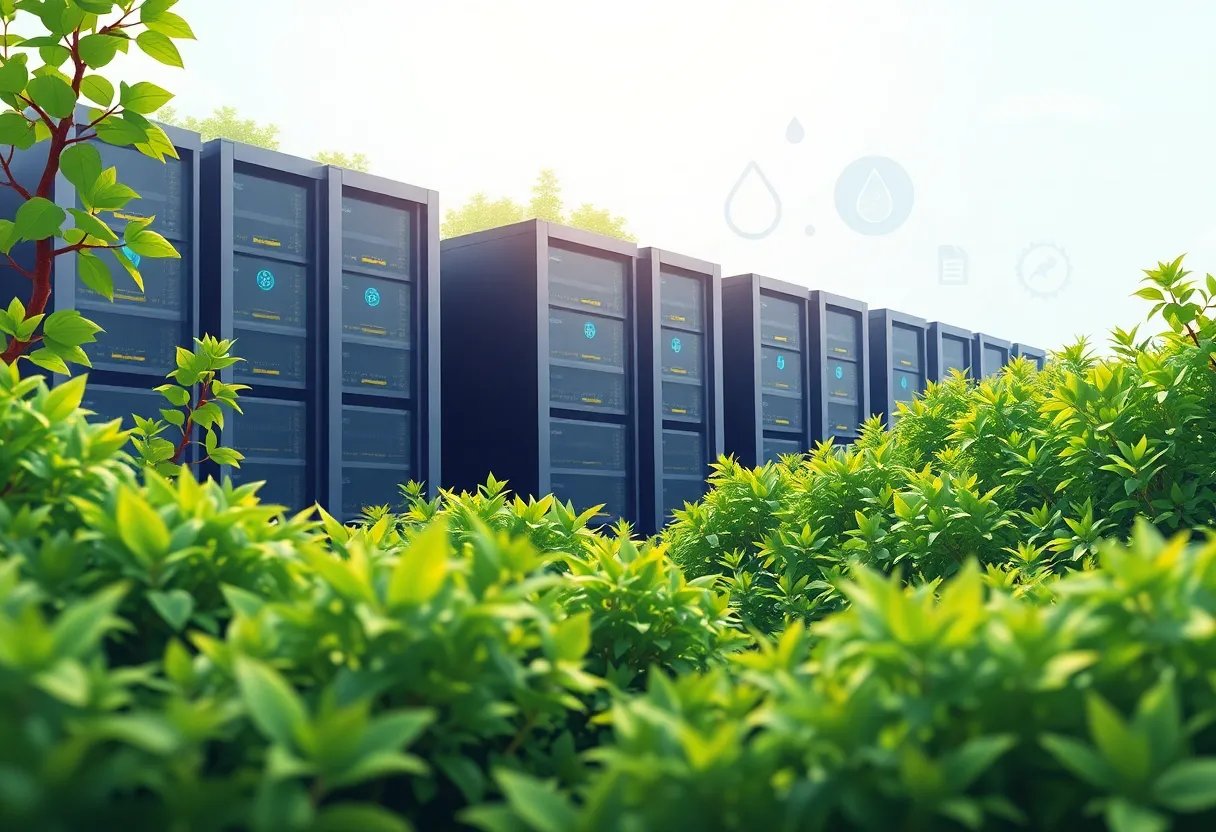California, September 28, 2025
News Summary
California lawmakers proposed stricter regulations on data centers in 2023 aimed at protecting the environment and consumers. However, only two out of four bills made it to Governor Newsom, and those were significantly weakened. Key issues include water usage and increased energy demands as data centers proliferate, raising environmental and public health concerns. Community leaders and environmental advocates criticize the lack of transparency and effective regulation amidst rising resource consumption associated with data center expansions.
California lawmakers’ attempts to regulate data centers in 2023 have faced significant obstacles, concluding with only two of four proposed bills reaching Governor Gavin Newsom’s desk after nine months of legislative inaction. The two bills that made it through have been considerably weakened, raising concerns among environmental advocates and community leaders.
Initially, California legislators aimed to implement stricter regulations on data centers to protect both the environment and electricity ratepayers. However, as the legislative session progressed, the scope of these initiatives diminished. Notably, two critical bills failed to advance: one intended to mandate data centers to disclose their power usage, while the other sought to promote cleaner energy adoption.
The remaining bills under consideration include:
- Senate Bill 57: This bill requires data center operators to disclose water use, albeit with less public accessibility for the information.
- Assembly Bill 93: This legislation mandates that data centers inform water suppliers about their estimated water consumption during business license applications or renewals. It also encourages the creation of efficiency guidelines related to water usage.
The growing presence of data centers has emerged as a significant public policy issue, particularly as they play a crucial role in internet content storage and transmission, affecting platforms such as TikTok and Amazon. As interest in artificial intelligence (AI) technologies like ChatGPT rises, California has witnessed a consequent increase in data centers, heightening concerns about resource consumption.
The proliferation of data centers has led to increased demands for water for cooling essential components, raising alarms over the stress on local water reservoirs. Moreover, as demand for electricity rises to service these facilities, California residents could potentially face higher utility costs. The state currently houses one of the world’s densest clusters of data centers and has experienced a reported 40% increase in hookup requests from Pacific Gas and Electric (PG&E).
To streamline operations, the California Public Utilities Commission made it easier for data centers to apply for projects in July. However, amendments to Senate Bill 57 diluted its initial objective of safeguarding energy customers from the financial burden of data center infrastructure, reducing it to only assessing potential cost shifts. Even the Utility Reform Network, a group that initially supported the bill, has described the final version as ineffective due to lobbyist influence.
While PG&E initially opposed Senate Bill 57, it later withdrew its opposition following the bill’s modifications. California’s unique drought conditions have intensified scrutiny of data center water usage, with studies indicating that many future projects are planned for areas already experiencing water stress.
Environmental advocates argue that the lack of mandated transparency in water usage makes it challenging for communities to grasp and respond to the local impacts of these data centers. Critics assert that the legislative efforts have been watered down in favor of data center operators and that public access to vital water usage data is at risk.
Furthermore, California’s electrical grid is grappling with the increasing energy demands posed by data centers, with projections suggesting that by 2030, their power requirements could be equivalent to that of millions of homes. Local governments and citizens are increasingly engaged in discussions about the environmental ramifications of data center expansions, emphasizing the need for clear planning and fairness in the regulatory process.
Ongoing disputes related to data center growth also revolve around water use, air quality, and the electricity demands these facilities create, leading to possible public health implications. Concerns persist regarding the use of diesel generators at data centers, which have been linked to significant greenhouse gas emissions. This creates a polarization between technology advocates and environmentalists, who are striving to find a balance between expanding infrastructure and adhering to sustainable climate goals.
Experts emphasize the necessity for innovative solutions within the data center industry to manage the escalating demands for resources as California navigates a rapidly changing climate.
Frequently Asked Questions
- What are the goals of the proposed regulations on data centers in California?
- California lawmakers began the year indicating a desire to impose stricter regulations on data centers to protect the environment and electricity ratepayers.
- How many proposed data center bills have made it to the governor?
- After nine months, only two out of four proposed data center bills are currently on Governor Gavin Newsom’s desk, and those have been significantly weakened.
- What are the key features of Senate Bill 57 and Assembly Bill 93?
- Senate Bill 57 mandates water use disclosure by data center operators but allows the information to be less accessible to the public. Assembly Bill 93 requires data centers to inform water suppliers of their estimated water consumption during business license applications or renewals and encourages the development of water use efficiency guidelines.
- Why are data centers becoming a public policy concern?
- Data centers are increasingly seen as a public policy concern due to their role in storing and transmitting content on the internet, linked to platforms like TikTok and Amazon.
- What is the future demand for electricity due to data centers?
- California’s grid faces challenges with growing data center energy demands, with projections indicating the need equivalent to power supply for millions of homes by 2030.
- What are the environmental implications of data center expansions?
- Data center expansions have led to disputes over water consumption, air quality, and electricity loads, posing potential public health risks.
Deeper Dive: News & Info About This Topic
- Los Angeles Times: California Legislature Passes Two Watered Down Bills
- Wikipedia: Data Center
- LAist: AI Supercomputers Need Electricity
- Google Search: Data Centers Regulation
- Power Engineering: California Data Center Growth
- Encyclopedia Britannica: Data Center
- Capital & Main: California AI Data Centers Grow
- Google News: Data Centers California

Author: STAFF HERE HUNTINGTON BEACH
The Huntington Beach Staff Writer represents the experienced team at HEREHuntingtonBeach.com, your go-to source for actionable local news and information in Huntington Beach, Orange County, and beyond. Specializing in "news you can use," we cover essential topics like product reviews for personal and business needs, local business directories, politics, real estate trends, neighborhood insights, and state news affecting the area—with deep expertise drawn from years of dedicated reporting and strong community input, including local press releases and business updates. We deliver top reporting on high-value events such as the Huntington Beach Surf City USA Marathon, the U.S. Open of Surfing, Fourth of July celebrations at the Huntington Beach Pier, and community festivals at Huntington Beach Central Park. Our coverage extends to key organizations like the Huntington Beach Chamber of Commerce and Visit Huntington Beach, plus leading businesses in retail, hospitality, and outdoor recreation that drive the local economy. As part of the broader HERE network, including HEREAnaheim.com, HERECostaMesa.com, HERESantaAna.com, and HERELosAngeles.com, we provide comprehensive, credible insights into Southern California's dynamic landscape.





